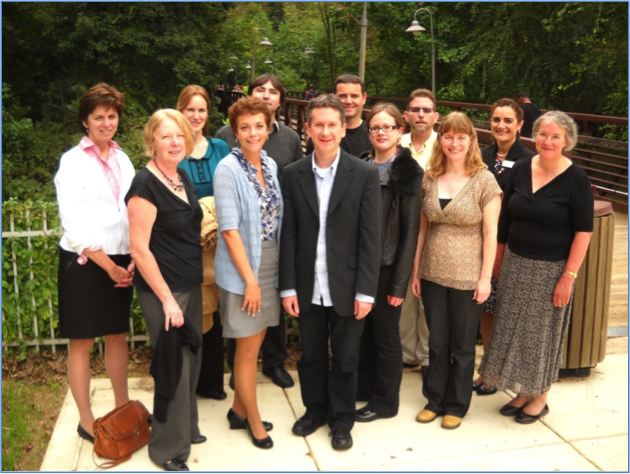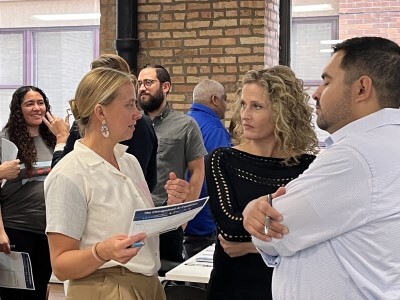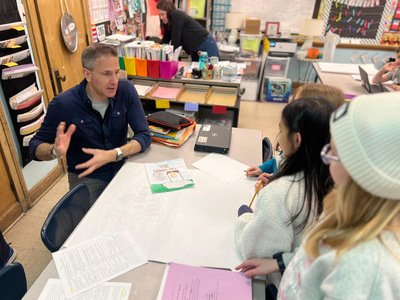Technology Tools
Bridge to Success: Ready for Crossing
Topics

Educators often take advantage of educational technologies as they make the shifts in instruction, teacher roles, and learning experiences that next gen learning requires. Technology should not lead the design of learning, but when educators use it to personalize and enrich learning, it has the potential to accelerate mastery of critical content and skills by all students.
The collaborators on Bridge to Success, one of the “Building Blocks for College Completion” from NGLC’s first wave of funding, have recently wrapped up the project’s active phase.
The collaborators on Bridge to Success, one of the “Building Blocks for College Completion” from NGLC’s first wave of funding, have recently wrapped up the project’s active phase with the traditional steps: wrote a final report, held a conversation with each other about what happened, said goodbyes to collaborators who have become friends, and talked about ambitions that we still have. What is less usual is that we are also finding new people adopting our content, watching access to the site continue to rise, and preparing new versions with exciting new features (all without additional funding to do so!)

The Open University, the University of Maryland University College, Anne Arundel Community College, and the Office of Educational Innovation and Technology at the Massachusetts Institute of Technology joined forces in the Bridge to Success project to tackle a very important challenge facing higher education: how to help people who, for whatever reason, find it hard to cope in the early stages of college study. The MOOC phenomenon shows signs of missing such people as it offers engaging learning experiences for the committed rather than nurturing the skills of learning itself. Getting learners on the right path is an international issue, not a local one: Using an open approach offered a way for us to transfer findings across various barriers, including the Atlantic Ocean. Our result is content in the open that has been piloted and used across a variety of different situations. The project’s leadership has received feedback from users that what we have produced works to help educators tackle a real problem. We also have some statistically significant indicators that student performance is improved.
This post provides links to that open content, highlights some of our findings, and shares breaking news about the latest version of the course, which launched this week.
What We Learned from Bridge to Success
Open educational resources can help struggling learners. In the last year there has been a surge in open courses that reach large numbers of learners. While MOOCs have attracted a lot of attention, and indeed many learners, the majority of those, by their own analysis, have existing qualifications or are eager to advance to further study. Self-directed, motivated individuals who find personal value in access to courses do not represent the target group for Bridge to Success. Instead, we designed the material to help learners who are struggling or not coping. In our project, the content was piloted through community colleges and other organizations.
Flexibility and freedom help take up. We let the colleges choose the ways in which they used the materials. They came up with different ways to use it: different paths through the courses, methods of support, and ways to guide users.
Educators respond positively to the opportunity to use open material. While the effectiveness of open courses is difficult to evaluate, we collected and attended to feedback from the teachers and educators involved. They expressed great belief in what we were doing and in the benefits for the learners. For example, teachers reported over 95% subject mastery for the learners who completed the course.
Measuring improvement is challenging but possible. We were able to compare cohorts taking for-credit courses in parallel and after using the Bridge to Success Mathematics. This comparison showed statistically significant improvement in grades. While we would need additional research to confirm these findings, indications so far backs up the evidence from other NGLC projects, such as Cerritos College’s Project Kaleidoscope, that open approaches often improve performance.
“Open” can reach places we do not expect. While our target was helping those enrolled in college courses, we found it exciting when the courses were used more widely. For example, charities used the materials to enable some of the most disadvantaged in society to return to an education or workforce path.
Continuing to develop is necessary to incorporate technology’s rapid evolution. New versions of the courses are available as of May 22, 2013. We have added badges and have restructured the course to help self-study and to celebrate success. The new version takes some lessons from MOOCs to organize around a start date and to offer some extra support for a limited period. Timed to coincide with Adult Learning week in the United Kingdom, the supported period will run for a week, after which point the materials will continue to be available as open resources. These new versions are as follows:
Learning to Learn (L2L): This is a course for anyone who needs help to get started in college-level study.
Succeed With Math (SWIM): This is a confidence-building mathematics course.
These are both good for use when learners are failing in trying to take college courses. They are free, can be used from our servers, and have been picked up in very flexible ways. These versions build on the versions piloted in Bridge to Success, with the intention of making the material easier to study independently by adding challenges that bring out the achievements for learners as they proceed.
The original Bridge to Success versions are also provided with open availability from our servers:
Learning to Learn (original version)
Succeed with Math (original version)
For more about the project, including introductory videos, webinars, and guides for educators and learners on how to make use of the courses, visit http://bridge2success.aacc.edu/.




